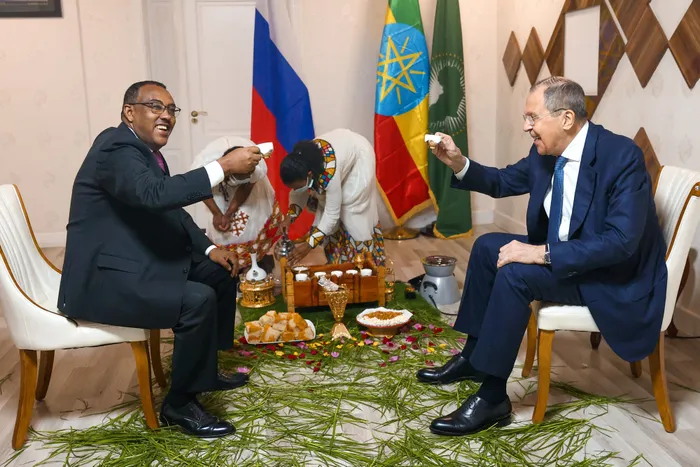World News Weekly Round-up

Picture: Russian Foreign Ministry/Handout via Reuters – Russian Foreign Minister Sergei Lavrov attends a meeting with Ethiopian Deputy Prime Minister and Foreign Minister Demeke Mekonnen in Addis Ababa, Ethiopia, July 27, 2022. African countries, which have a tangled legacy of ties with both the West and the former Soviet Union, have largely avoided taking sides over the war in Ukraine, but are being wooed by the powers on both sides of this divide, the writer says.
By Shifaan Ryklief
Compared to the major events over the past two weeks when Sri Lankan protestors stormed the president’s home the UK prime minister Boris Johnson stepping down, news from around the world has eased up this week.
In light of Johnson’s resignation, last Friday former UK Chancellor of the Exchequer, Rishi Sunak, and foreign secretary Liz Truss emerged as the two final candidates in the Tory leadership race following a series of ballots.
The duo will now go through a postal ballot among all Conservative Party members, numbering about 200,000, over the summer. The winner will be announced on September 5 and will automatically become UK's next prime minister, replacing outgoing Boris Johnson.
Earlier this week, Truss beat Sunak in a TV debate according to a survey of ruling Conservative party members, with 47 percent of respondents to pollster Opinium saying Truss performed better and 38 percent who thought likewise about Sunak.
Meanwhile, outgoing Johnson said he hopes to visit Ukraine once more before he leaves office and meet with Volodymyr Zelensky.
Staying with Ukraine, infrastructure minister Oleksandr Kubrakov said that Ukraine was preparing to start grain exports via the Black Sea ports this week under the grain deal signed with Russia last week in Türkiye.
Speaking at a media briefing aired on the Ukrainian infrastructure ministry's Facebook page, Kubrakov said the movement of ships from the Black Sea ports is due to start by the end of this week.
Furthermore Ukraine counterpart Russia have been busy this week strengthening ties on the African continent. Russian foreign minister Sergei Lavrov visited Congo Republic on Monday, the second leg of an African tour aimed to strengthen Moscow's ties with a continent that has refused to join Western condemnation and sanctions over Russia's invasion of Ukraine.
African countries, which have a tangled legacy of ties with both the West and the former Soviet Union, have largely avoided taking sides over the war in Ukraine. Many import Russian grain and, increasingly, energy too but they also buy Ukrainian grain and benefit from Western aid flows and trade ties.
Lavrov has also spent completed trips to Uganda and Egypt, with Ugandan leader Yoweri Museveni welcoming the visit by Lavrov and saying he saw no reason to criticise Russia over the invasion of Ukraine.
Speaking alongside Lavrov, Museveni praised Russia as a partner in the struggle against colonialism going back a century.
At the same time, French President Emmanuel Macron has also been courting Africa on behalf of the West and visited Cameroon, Benin and Guinea-Bissau while US Special Envoy for the Horn of Africa Mike Hammer makes his way to Egypt and Ethiopia.
Heading to Asia, according to the Washington Post, the death of former prime minister Shinzo Abe reveals a complex story of discrimination and xenophobia.
Abe was campaigning on behalf of a fellow Liberal Democratic Party politician in the city of Nara. His party is known for dominating postwar Japan, which maintains a notion of unique homogeneity in which the concepts of race, culture and language are synonymous.
Japan’s increasing diversity from foreign residents include about 24,000 Indigenous Ainu, 3 million Burakumin (descendants of feudal-era outcast groups), 600,000 Zainichi Koreans (descendants of Japan’s colonial annexation), and 1 million Okinawans.
Ryklief is a multimedia journalist at African News Agency (ANA) Twitter: @FootballFaan
This article is original to the The African. To republish, see terms and conditions.